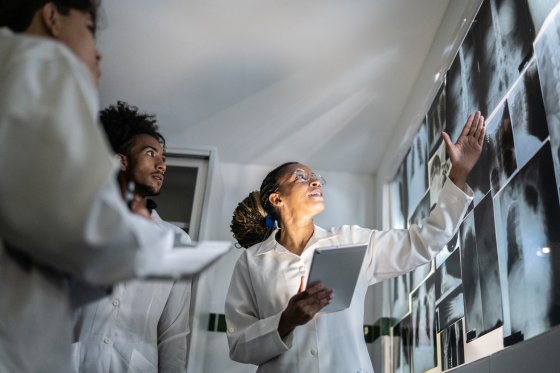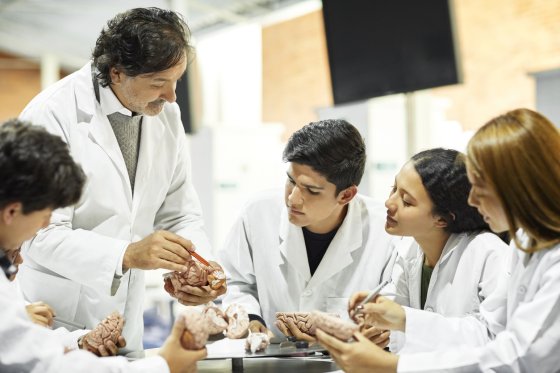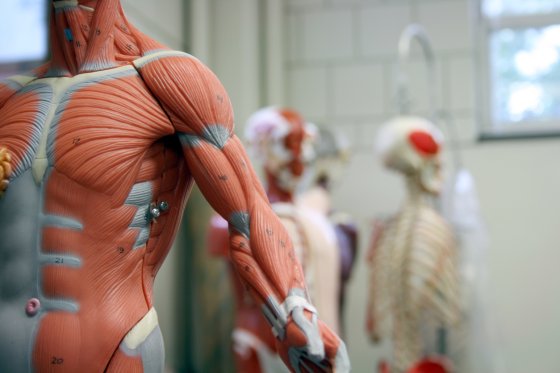The Anatomy Learning Institute participates in a diverse range of scholarship in the anatomical and medical sciences. Below is a list of areas that are being investigated by faculty at the ALI. If you are interested in learning more about our research or how to get involved, please contact us.
Clinical Application of Anatomy

Improving anatomical knowledge is a well-documented path to improving patient care. We are interested in investing in the diverse application of anatomy in medicine, dentistry, physical and occupational therapy, athletic training, and more.
Recent Publications
- Pain Patterns of the Temporomandibular Joint Dysfunction and Implications of Stress-Related Behaviors: A Pilot Study.
- Investigation into the use and impact of ankle supports among hockey players
- Surgical Faculty’s Perspectives on the Unknown Utility of Alcohol‐Preservation in Surgical Resident Education
- Using Soft-Preserved Body Donors to Improve the Anatomy Learning Experience for Orthopedic Residents
- The utility of soft-preservation in Medical Education: Current trends & future directions
Teaching and Learning in Anatomy

Anatomy is the cornerstone of all health science disciplines; therefore, it is crucial to investigate ways to improve the learning and teaching process. We are interested in investigating different ways to improve student learning and experience.
Recent Publications
- Who is teaching anatomy? An examination of the demographic characteristics, academic backgrounds, and professional responsibilities of US anatomy teachers
- Graduate anatomy education: How are we training the future generations of anatomy educators?
- The Universal Design for Learning Framework in Anatomical Sciences Education
- Medical Students' Opinions of Anatomy Teaching Resources and Their Role in Achieving Learning Outcomes
- Student-Centered Learning in the Anatomy Laboratory: Medical Students' Perspective
- Anatomical and Clinical Education in Physical and Occupational Therapy: Influence of Integration and Soft Preservation.
Bioethics

Working with body donors is a privilege which everyone should treat with utmost respect. This opportunity provides learners and educators with a chance to address important topics such as respect, dignity, death and dying, and self-care. We are interested in investigating the social, spiritual and ethical impacts.
Recent Publications
- Human body donation programs best practices and recommended standards: A task force report from the American Association for Anatomy
- The intersection of anatomy and spirituality
- Giving a voice to our silent teachers: Whole body donation from the donor perspective at one donation program in the United States
- Using the Anatomy Learning Space as a Laboratory to Teach Ethics and Professionalism
- Investigating the Status of Whole-Body Donation Across the United States of America.
- Human body donation: How informed are the donors?
- 10 tips on working with human body donors in medical training and research
- The road to best practices in body donation
Body Donor Research

Working with body donors is considered to be a superior way to learn anatomy and improve patient care. We are interested in maximizing the generous gift made by our body donors to improve education, research and training.
Recent Publications
- Human body donors at academic institutions in the United States of America: An investigative study
- Human body donation and surgical training: a narrative review with global perspectives
- Human preservation techniques in anatomy: A 21st century medical education perspective
- A comparison of embalming fluids on the structures and properties of tissue in human cadavers
- Developing a quantitative method to assess the decomposition of embalmed human cadavers
- The antimicrobial capacity of embalming solutions: a comparative study